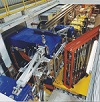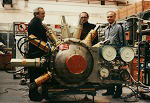|
STRUCTURE
ACTIVITIES
ACHIEVEMENTS
PUBLICATIONS
EVENTS
HISTORY
USEFUL INFORMATION
SOCIAL LIFE
|
|
 |
 |
I n t e r m e d i a t e E n e r g y P h y s i c s
(continued - page 4)
Experiment CB-ELSA.
 Руководитель группы ПИЯФ: В.П. Коптева
Руководитель группы ПИЯФ: В.П. Коптева
В 1995-2015 гг. группа сотрудников ОФВЭ ПИЯФ
(под руководством В.П. Коптева)
принимала участие в создании магнитного спектрометра ANKE, установленного на внутреннем накопительном кольце ускорителя COSY (FZ-Julich, Германия).
Главной особенностью эксперимента стал предложенный физиками ПИЯФ метод
регистрации задержанного сигнала от распада K+. мезонов, позволивший улучшить соотношение сигнал-фон в 105 раз. В ходе выполнения экспериментальной
программы этого международного сотрудничества было проведено комплексное исследование рождения странных мезонов и барионов в нуклон-нуклонных
и нуклон-ядерных взаимодействия, которое позволило выявить особенности взаимодействия странных частиц с обычной материей.
Подробнее о результатах исследований, проведенных на спектрометре ANKE, можно узнать из отдельного материала на
сайте Лаборатории барионной физики.
Experiment Saturn (Saclay)
 PNPI Group Leader: A.A. Vorobyov
PNPI Group Leader: A.A. Vorobyov
In the period from 1973 to 2008, HEPD PNPI physicists actively participated in several experimental programs carried out at the Saclay Nuclear Centre (France)
on the Saturn I and Saturn II accelerators.
Differential cross sections for elastic and inelastic scattering of protons with an energy of 1 GeV on a number of nuclei of isotopes Ca, Ni, and Ti were measured.
As a result of the analysis of the measured cross sections, the distributions of the nuclear matter in the ground state and the transition densities
of the studied nuclei were determined.
The small-angle scattering of polarized neutrons by protons was studied at the neutron energy of 378-1135 MeV using the ionization spectrometer
IKAR
developed at PNPI. The obtained data were used in partial-wave analyses of nucleon-nucleon scattering.

In an exclusive experiment with complete reconstruction of the reaction kinematics, the process of disintegration of polarized deuterons with an energy
of 2 GeV due to their interaction with a liquid-hydrogen target was investigated.
Also, the scattering of α-particles with an energy of 4 GeV on hydrogen nuclei was studied with the help of a SPES4-π track detector fabricated at PNPI with
the purpose to study the Roper resonance. It has been shown that inelastic scattering of α-particles on a proton occurs due to excitation and decay
of the Δ (1232) resonance in the incoming α-particle or excitation and decay of the Roper N(1440) resonance on the target proton, the Roper resonance decaying
into a proton and a σ-meson, which then decays into two π-mesons in the S-state with the isotopic spin I = 0.

|
 |
 |